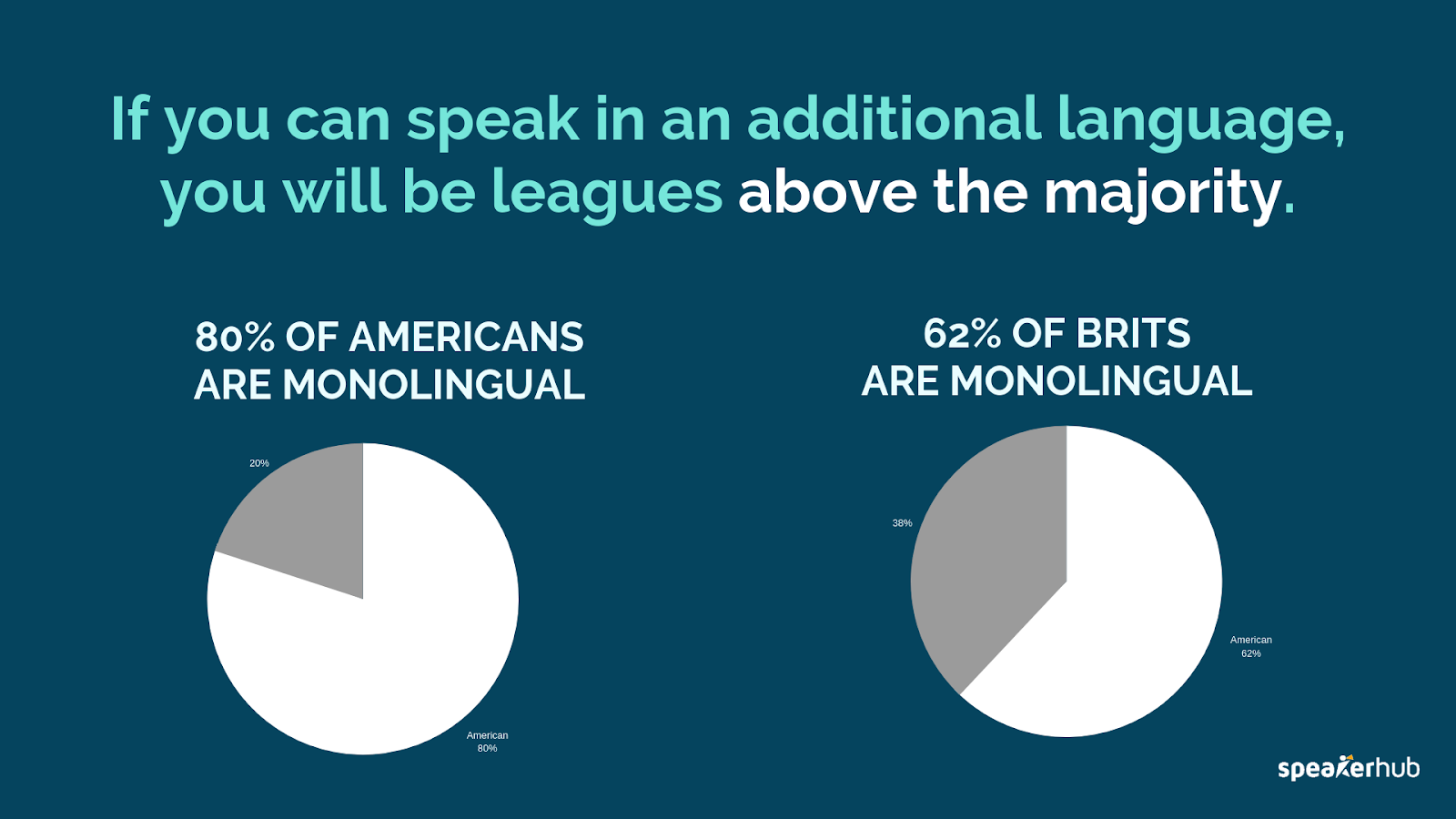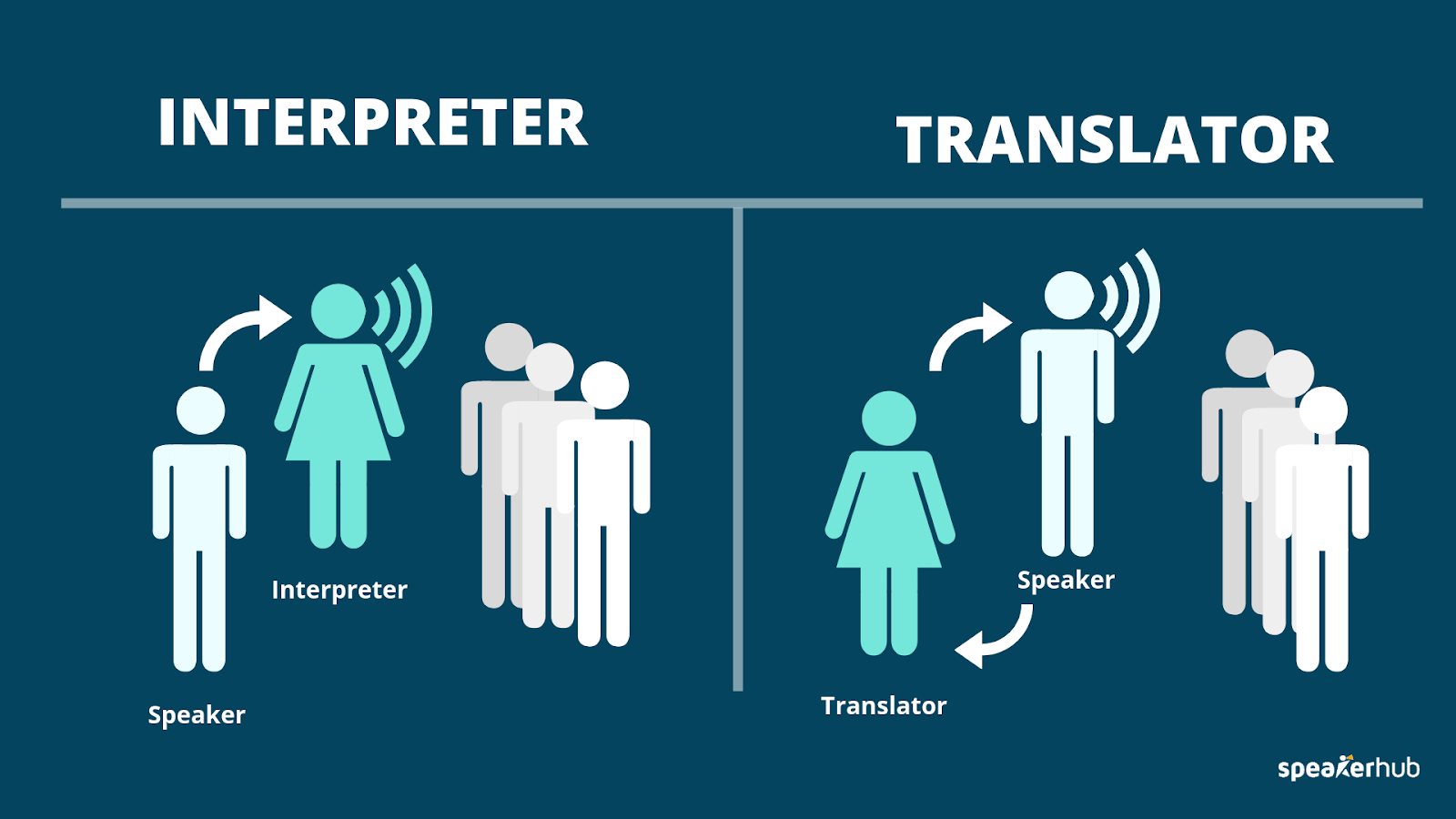International speaking: working with translators, and how they can help you give a talk in another language

It's a pretty safe bet that if you are getting on stages, you’ve got your native language down, but if you have ambitions to hit the international stage, you might want to consider learning how to give your talk in other languages.
80% of Americans and 62% of British people are monolingual, meaning that if you can speak an additional language, you will be leagues above the majority.

But maybe you haven’t attempted a second language since school—where to even start?
A good place to start is by gaining a working knowledge of the basics of the language. For example, the alphabet and phonetics.
But while you’re on the road to being fluent you can fast track by hiring some help: specifically, translators and interpreters.
This article will delve into the difference between translators and interpreters, the benefits of using a professional translation service and how to get the most out of it.
Read next: Be understood when presenting to international audiences
Do you need a translator or an interpreter?
Translators and interpreters both translate words while keeping meaning and context the same as in the original language.
Both have a good command of the two languages they are working with.
Both should have a good understanding of the culture and traditions of the countries where you wish to get your message across, enabling them to localize your message – they can translate/interpret using local words and phrases instead of just providing a literal translation.
Interpretation is the perfect solution if you are looking to deliver a speech in your native language but to an audience that doesn’t speak that language. When using an interpreter, you will speak in your native language and they will translate what you are saying in real time into the language of the audience.
Read next: Professional speaking: how to work with your interpreter
However, if you want to start booking more events on international stages and want to be head and shoulders above the competition, consider speaking in the language of your audience.

This is going to take more work and practice, and once again, hiring help will massively fast-track your ability to get on stage and deliver a great talk in another language.
Working with translators and language coaches
Beware, if you run your speech through Google Translate, you can come up with some pretty ropey translations.
Take these examples:


(See EgoLibris’ original tweet here.)
This is no slight on Google translate, it is an amazing tool that is continuously being developed, however you don’t want to get on stage and talk about goats and bucket months and coming across as a numpty who has no idea what they are saying.
If you want to sound professional, get a profession to help.
Specifically, you are looking localization experts. These are professionals who know how to alter a translation to match the local lingo of a specific area or region.

While both translating or interpreting involve converting one language to another, translation can be oral or written, while interpretation is usually oral.
In the preparation stage, you’ll want to be using a professional translator. They will help you make sure you have the correct grammatical structure and are using the right words. They will also catch mistakes that will cut into your credibility, like talking about goats.
Give them the written form of your speech well in advance, and make sure you explain both the specific goals of your talk and who your intended audience is.
After they have translated the content, you’ll want to hire a translation speaking coach.
4 ways a translation coach can help
A translation professional can help you deliver a better speech in the following ways:
1. Improve the vocabulary of your text
A translator can help you enrich your vocabulary in your target language.
A translation expert will be able to take the word choices you have made in your original speech and advise on the options for converting these to the language you plan to present it in.
Their words can help liven up and shape your speech so that it is well suited to your intended audience.
The meaning of a sentence can be lost in translation when used in a literal sense, just like the above examples from Google Translate. A translation expert will rephrase these for you.
They can also help localize your lingo. Just as in your native language, commonly used words can be very regionalized, varying from city to city, or state to state.
The translation professional will be mindful of these factors and will provide a translation that suits your audience.
2. Provide a subject-specific translation
Another thing that your chosen language professional can help with is to help explain the complex concepts of your field in a way that listeners will understand.
Besides experts in general translation, you can find subject specialists in different areas of translation, including medical, legal, life sciences, and business.
If your text has several technical terms, make sure you hire a subject expert instead of a general translator to help you deliver it in the target language.
3. Audience Engagement
Engaging native listeners as a non-native can be a challenge.
Personal anecdotes that help you connect with listeners may not register due to cultural differences. A competent translator can provide you with a joke or story that will work well with your speech to replace the connecting points you would have used in your native language.
The translator can also advise on the appropriate use of body language for your audience.
From hand gestures to shaking or nodding your head, body language means different things in different countries.
READ NEXT: Where will a "rock on" sign offend your audience? Plus 9 other gestures to avoid internationally.
A professional translator will be able to support you to deliver your speech by including gestures that make it appear more natural in subtle ways.
4. Preparation and practice
With a contextually appropriate and word-perfect translation in hand, work with your translation coach on the following:
-
correct pronunciations
-
appropriate gestures
-
cadence, and where to add appropriate pauses
-
speaking without stumbling
Film or create an audio recording of your coach delivering your talk, this will help when it comes to practice, because you’re going to need to do a fair bit of that, and having the recording will help.
Leave yourself time for practising.
Don’t attempt to learn your talk an in a different language a week before you are supposed to deliver it.
Start working weeks, if not months, in advance. If you don’t practice, you will likely have hitches, and stumbling around in another language will undercut your credibility.
Conclusion
In any language, finding the right words to say often requires a strong connection with the people speaking that language.
If you’re looking to deliver a speech in another language that is of the same quality as your regular speeches, professional language services can make all the difference.
From general translators to subject-specific and localization experts, the right support is out there to enable you to overcome the challenge.
Read next:
Be understood when presenting to international audiences
Professional speaking: how to work with your interpreter
Presenting around the world: Cross-cultural humour guide
Where will a "rock on" sign offend your audience? Plus 9 other gestures to avoid internationally.
About the Author:
Charles Ramos works at Tomedes translation company, a language service that supports professionals around the world to hone their language skills for a diverse range of activities, from marketing to public speaking.






